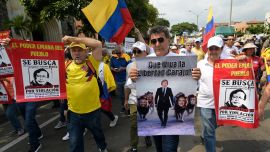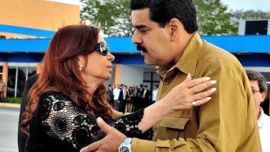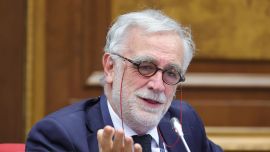Demonstrators took to the streets in various cities across Colombia on Wednesday to voice their discontent with the government of leftist President Gustavo Petro.
The protests, which saw thousands of people rallying against Petro's social reform initiatives and the ongoing violence in the country despite peace negotiations with armed groups, underscored growing frustration among citizens.
Marching under the banner "Petro Out!", crowds dressed in white flooded the historic centre of Bogotá and filled the Plaza de Bolívar, symbolising widespread dissatisfaction with the current administration.
"There is rampant insecurity in the countryside and in the city. The people are tired and that's why" we are marching, said Luis Chaparro, a 46-year-old retired military officer dressed in camouflage gear.
Similar demonstrations occurred in cities like Cali, Medellín, Barranquilla, and Bucaramanga, with protesters displaying Colombian flags alongside banners referencing prominent right-wing figures like former US president Donald Trump, Brazil ex-president Jair Bolsonaro and Argentina's President Javier Milei.
Critics of President Petro, who took office in August 2022 as Colombia's first left-wing leader, highlight concerns over his proposed reforms targeting the pension, health, and labour systems. Despite facing resistance in Congress, where he has lost his majority, Petro has pushed for measures aimed at reducing private involvement in health services and pension payments while expanding benefits for workers.
Opposition figures have also raised alarms over the concessions granted to armed groups as part of peace negotiations, accusing Petro's government of undermining security forces while providing undue benefits to criminals. The talks, fraught with setbacks involving rebel factions like the National Liberation Army (ELN) and dissidents of the Revolutionary Armed Forces of Colombia (FARC), have strained trust between the government and armed groups, leading to periodic crises.
Amid these challenges, concerns about financial mismanagement and economic hardship have further fuelled discontent. Petro's administration has faced scrutiny over allegations of waste, exemplified by the trial of his son on money-laundering charges and the loss of the 2027 Pan American Games venue due to payment failures.
Meanwhile, Colombians grapple with rising inflation and sluggish economic growth, exacerbating frustrations over the government's handling of the economy.
"We are subjected to scandals because of the unnecessary expenses, the absurd contracts, the theft in general," bemoaned Pilar Cardona, a 61-year-old naturopathic products saleswoman.
In addition, "life is terribly expensive – there are many people who are in dire need," she added.
As voices of dissent grow louder, Petro's popularity, hovering around 35 percent according to polls, underscores deep divisions within Colombian society.
While supporters view his presidency as a progressive force for change, critics fear Petro's policies may exacerbate existing challenges, deepening social unrest and economic instability. In the face of mounting pressure, Petro's ability to navigate these complexities will shape Colombia's trajectory in the coming years.
























Comments